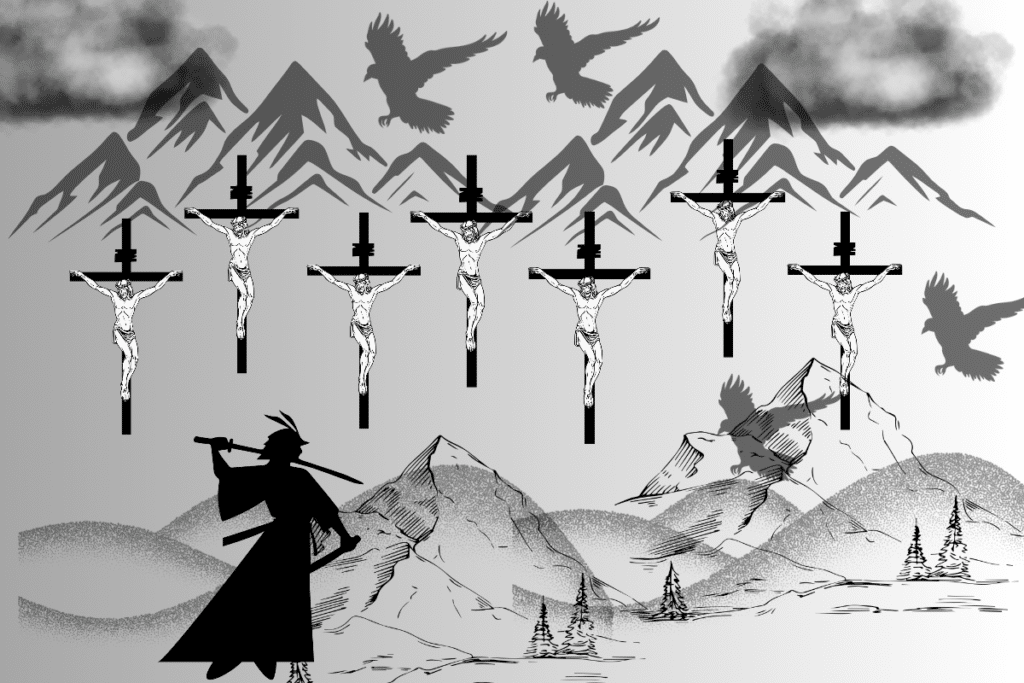RADIANT RESILIENT RIZPAH IN THE BIBLE
In English, the name “Rizpah” is of Hebrew origin and its meaning is often interpreted as “coal” or “hot stone.” It is derived from the Hebrew word “רִצְפָּה” (Ritzpah), which can symbolize strength, resilience, and steadfastness.
Rizpah is a character mentioned in the Bible, particularly in the Old Testament. She was one of King Saul’s concubines. Her story is found in 2 Samuel 3:7 and 21:8-14. In 2 Samuel 21, she plays a role in the story of the Gibeonite revenge, where she protects the bodies of her sons who were executed as part of a treaty with the Gibeonites to end a famine in Israel. Rizpah in the Bible emerges as a figure of remarkable strength and endurance. Her story, while tragic, serves as a beacon of hope and inspiration for those facing adversity.

Background and Context of Rizpah in the Bible
Who Was Rizpah?
Rizpah in the Bible, a concubine of King Saul, was a woman of noble birth who faced immense tragedy in biblical events. She was the mother of two sons, Armoni and Mephibosheth, who were killed as part of a complex series of events involving David’s rise to power.
After their deaths, Rizpah in the Bible displayed remarkable strength and devotion by guarding their bodies for five months, ensuring they received a proper burial. Her story, found in 2 Samuel 21:1-14, serves as a poignant example of sacrificial love and unwavering loyalty amidst political turmoil and personal loss.
Role of Rizpah in the Bible
The story of Rizpah in the Bible is primarily found in the book of 2 Samuel, specifically in chapters 3 and 21. Her narrative unfolds during a tumultuous period in Israel’s history following the death of King Saul. Rizpah, a concubine of Saul and mother of Armoni and Mephibosheth, faces immense tragedy as her sons are killed and left to rot on trees.
Despite the overwhelming stench and lack of support, Rizpah in the Bible remains vigilant, protecting their bodies from scavengers for five months until King David intervenes, burying the bodies and honoring the memory of Saul and his descendants.
The Tragic Story of Rizpah in the Bible
Rizpah’s Sons Executed
After King Saul’s death, his kingdom faced turmoil, leading to the execution of seven of Saul’s descendants, including two of Rizpah’s sons. This tragic event was believed to be a form of divine retribution for Saul’s massacre of the Gibeonites, breaking a treaty established since the Israelites entered the Promised Land.
Rizpah in the Bible, despite her grief and powerlessness, displayed unwavering devotion by guarding the bodies of her sons and the others, ensuring they received a proper burial. Her actions, though born out of tragedy, ultimately led to the end of a famine and the restoration of the land.

Rizpah’s Act of Devotion
In the face of unimaginable grief following the execution of her sons, Rizpah in the Bible displayed remarkable devotion. Despite her anguish, she stood vigil over their bodies, shielding them from scavenging animals and ensuring they received a proper burial.
This act of protection, which lasted for five months, was a testament to her unwavering love and dedication to her sons. Her actions, though born out of tragedy, ultimately led to the end of a famine and the restoration of the land.
Symbolism and Legacy of Rizpah in the Bible
Rizpah’s Example of Motherly Love
Rizpah’s unwavering commitment to ensuring her sons’ dignity, even in death, symbolizes the profound depth of a mother’s love. Her actions underscore the extraordinary lengths a parent will go to honor and protect their offspring, even in the face of unimaginable grief and tragedy.
By guarding the bodies of her sons for five months, Rizpah in the Bible demonstrated an unyielding devotion that transcended the political turmoil surrounding their deaths. Her story serves as a poignant reminder of the sacrificial nature of parental love and the indomitable human spirit in the midst of profound loss.

Rizpah’s Influence in Biblical Interpretation
The story of Rizpah in the Bible has sparked debates among scholars and theologians, with interpretations varying. Some see her as a powerful symbol of maternal love, showcasing the depths a mother would go to protect her children even in death.
Others view her actions as a profound form of protest against the injustices of her era, highlighting her defiance and unwavering dedication to ensuring her sons’ dignity. Regardless of the interpretation, Rizpah’s story resonates as a poignant example of love, courage, and resilience amidst tragedy and societal turmoil.
Lessons from Rizpah in the Bible
From the story of Rizpah in the Bible, there are several valuable lessons that we can learn:
- The Power of Resilience: Despite facing unimaginable tragedy and loss, Rizpah in the Bible shows incredible resilience by refusing to be overcome by despair. Her ability to endure and persevere through difficult circumstances teaches us the importance of resilience in overcoming adversity in our own lives.
- Unwavering Devotion: Rizpah’s unwavering devotion to her sons, even in death, serves as a powerful example of love and loyalty. Her commitment to protecting their bodies from harm demonstrates the depth of a mother’s love and the importance of standing by those we care about.
- Courage in the Face of Injustice: Rizpah’s courage to stand up against injustice and demand dignity for her sons’ remains is inspiring. Her willingness to confront societal norms and challenge authority teaches us the importance of speaking out against injustice, even when it may be difficult or dangerous.
- Persistence and Determination: Despite facing numerous challenges and obstacles, Rizpah in the Bible remains persistent in her quest to honor her sons’ memory. Her determination to see her mission through to the end serves as a reminder of the power of persistence and determination in achieving our goals.
- The Importance of Compassion: Rizpah’s compassion for her sons, even in death, highlights the importance of empathy and compassion towards others. Her willingness to endure personal hardship for the sake of her loved ones teaches us the value of selflessness and compassion in our relationships with others.
- Faithfulness and Loyalty: Rizpah’s unwavering faithfulness to her sons’ memory exemplifies the importance of loyalty and commitment. Her refusal to abandon them, even in the face of societal pressure, teaches us the importance of standing by those we love and remaining faithful to our principles.
Overall, the story of Rizpah in the Bible offers timeless lessons about resilience, devotion, courage, persistence, compassion, and faithfulness that continue to resonate with readers today.
Rizpah’s Relevance Today
Modern Interpretations of Rizpah in the Bible
The story of Rizpah in the Bible continues to resonate with contemporary audiences due to its universal themes of grief, loss, and societal upheaval. Her unwavering dedication to protecting her sons’ dignity in death, despite the overwhelming circumstances, serves as a powerful testament to the enduring power of maternal love. Her actions also highlight the struggles of marginalized groups, such as the Gibeonites, who were victims of systemic injustice.
As a result, The story of Rizpah in the Bible transcends historical context, speaking to the ongoing struggles of individuals and communities worldwide who face similar challenges, and offering a powerful reminder of the importance of standing up against injustice and advocating for those who are vulnerable.
Rizpah’s Influence on Contemporary Culture
The legacy of Rizpah in the Bible transcends biblical scholarship, resonating in literature, art, and popular culture as a beacon of solace and inspiration. Her unwavering devotion and resilience in the face of tragedy symbolize the enduring power of maternal love and the strength to stand against injustice.
Through her story, individuals find a source of courage and hope in challenging times, drawing parallels between Rizpah’s struggles and their own. Her example serves as a timeless reminder of the human capacity for love, resilience, and the pursuit of justice, making her a revered figure whose impact extends far beyond the pages of history.
Characteristics of Rizpah in the Bible

Rizpah in the Bible, depicted as, embodies several notable characteristics that resonate with readers across generations. While her story is brief, her actions and demeanor reveal key aspects of her character:
- Resilience: Despite facing immense personal tragedy, Rizpah in the Bible demonstrates remarkable resilience. After the execution of her sons, she refuses to succumb to despair, instead choosing to protect their bodies from desecration.
- Devotion: Rizpah’s unwavering devotion to her sons is evident in her vigil over their remains. For months, she guards their bodies, ensuring they receive a proper burial and dignified rest.
- Courage: In a time of political turmoil and uncertainty, Rizpah in the Bible exhibits courage in the face of adversity. Her willingness to confront societal norms and demand justice for her sons showcases her inner strength.
- Tenacity: Rizpah’s determination to see her mission through to the end is a testament to her tenacity. Despite the challenges she faces, she remains steadfast in her commitment to honor her sons’ memory.
- Motherly Love: Perhaps the most enduring aspect of Rizpah’s character is her profound maternal love. Her actions exemplify the depths to which a mother will go to protect and care for her children, even in death.
- Faithfulness: Rizpah’s loyalty to her sons and her refusal to abandon them, even in death, reflects her unwavering faithfulness. Her steadfastness serves as a model of fidelity and commitment.
- Compassion: Despite her own grief, Rizpah’s actions are motivated by compassion for her sons. Her willingness to endure hardship for their sake demonstrates her compassionate nature.
- Symbolism: Rizpah’s story also carries symbolic weight, representing themes of justice, mercy, and the enduring bond between parent and child. Her actions resonate as a timeless example of human virtue and strength in the face of tragedy.
Overall, Rizpah’s character in the Bible is characterized by resilience, devotion, courage, tenacity, motherly love, faithfulness, compassion, and symbolism. Her story continues to inspire and resonate with readers, offering profound insights into the complexities of the human experience.
Conclusion
In conclusion, the story of Rizpah in the Bible encapsulates timeless lessons of resilience, unwavering devotion, and maternal love. Her steadfast commitment to guarding her sons’ memory, even in the face of tragedy and injustice, stands as a beacon of hope for readers navigating adversity.
Rizpah’s poignant narrative not only highlights the enduring power of a mother’s love but also serves as a powerful reminder of the strength found in standing up against injustice and honoring the memory of loved ones. Her story continues to inspire and resonate with individuals seeking solace and strength in challenging times.
Reference
Unique FAQ’s
- Was Rizpah a prominent figure in biblical history?
- While Rizpah’s story is relatively brief in the Bible, her actions and symbolism have made her a notable figure in biblical narratives, particularly regarding themes of maternal love and devotion.
- What is the significance of Rizpah’s act of devotion?
- Rizpah’s unwavering commitment to guarding the bodies of her sons, even in the face of danger and hardship, serves as a powerful example of maternal love and loyalty. Her actions highlight the lengths to which a mother will go to honor and protect her children.
- How has Rizpah’s story been interpreted by scholars?
- Scholars have interpreted Rizpah’s story in various ways, often focusing on themes such as maternal love, justice, and social protest. Some view Rizpah as a symbol of maternal devotion and resilience, while others see her actions as a form of protest against the injustices of her time.
- Are there any modern adaptations of Rizpah’s narrative?
- Rizpah’s story has inspired various artistic and literary adaptations, including novels, plays, and artworks. These adaptations often explore themes of grief, loss, and the enduring bond between parent and child.
- What lessons can we learn from Rizpah’s story?
- Rizpah’s story teaches valuable lessons about resilience, devotion, and the power of maternal love. Her unwavering commitment to her sons’ memory serves as a reminder of the strength and courage that can be found in the face of adversity.


1 thought on “21. RADIANT RESILIENT RIZPAH IN THE BIBLE”